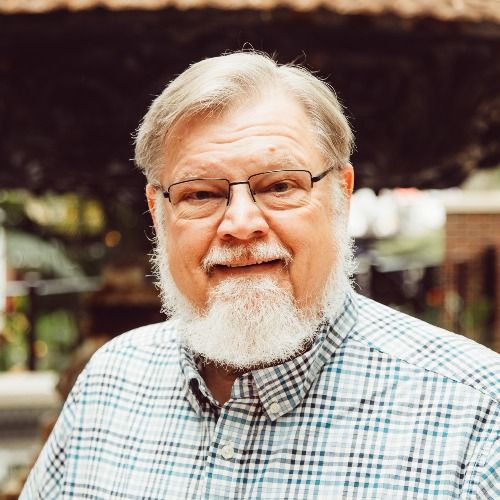Episode 859
Unveiling Power: A Deeper Look at the Passover Narrative
The "Daily Bible Refresh" is presented each day by Rev. Dr. Brad Miller who has a goal of speaking a bit of the bible into two million ears (one million people) in three years (2025-2028).
He is the author of "The A, B, C-1,2,3 Bible Study Guide" Free to you by clicking HERE.
Brad served as a local church pastor for forty years and has a background in radio and podcasting. Moreover, he is a life-long student of The Bible.
He believes in the words of Jesus that “scripture is fulfilled in your hearing” (Luke 4:21)
The "Daily Bible Refresh" is available seven days a week by 6:00 am ET. The episodes are no longer than ten minutes long and are...
- Understandable: A reading from the New Testament (usually the Gospel) selected from the Revised Common Lectionary using "The Message" translation.
- Relatable: You will have a couple of "points to ponder" from the text which will relate to your life
- Applicable: Every episode includes a way you can take action based on the reading
- A recommended resource to help you go deeper in biblical study and spiritual direction.
- A prayer for your day.
A companion resource to the Voice of God Daily Podcast is the “ABC Bible Study Guide” available by clicking HERE.
The "Daily Bible Refresh" is available every day at VoiceofGodDaily.com on Apple Podcasts, Spotify and all major podcast directories.
You can help Dr. Brad attain his goal of getting a bit of the bible into two million ears by subscribing to "Daily Bible Refresh" on Apple Podcasts, leaving a five-star rating, and writing a review. More importantly please share with your network of family and friends about the "Daily Bible Refresh".
Please make listening to the "Daily Bible Refresh" a part of your daily life.
Remember… “All scripture is God-breathed and useful”(2 Timothy 3:16)
The passage from Luke 22:1-13, which narrates the events leading up to the Last Supper, serves as a profound exploration of themes related to power, resistance, and community. We witness the religious authorities conspiring against Jesus, driven by fear of his growing influence. This dynamic highlights the often adversarial relationship between institutional power and prophetic movements, illustrating how those in authority may seek to quash dissenting voices that threaten their status quo. The relevance of this theme transcends time, as the struggle for justice and equity remains pertinent in our contemporary landscape.
In addition to examining power dynamics, the episode prompts a critical reflection on the figure of Judas Iscariot. His betrayal is reframed not merely as an act of treachery but as a manifestation of the complexities of human nature. The invocation of Satan entering Judas suggests a metaphorical understanding of how individuals can be influenced by external forces that exploit their weaknesses. This invites us to consider the societal pressures that lead to moral compromises, urging us to reflect on our complicity in the structures of oppression that pervade our lives.
The episode further emphasizes the radical nature of communal meals, exemplified by Jesus' preparation for the Passover. In a world marked by division, the act of sharing food becomes a powerful statement of inclusion and solidarity. The careful planning of this meal signifies a commitment to building community among diverse individuals, challenging the barriers that often separate us. The call to action at the conclusion of the episode encourages listeners to create spaces for gathering that reflect this radical hospitality, emphasizing the transformative potential of shared experiences in fostering understanding and reconciliation.
Takeaways:
- The Passover meal serves as a pivotal event, encapsulating profound themes of power and resistance.
- Religious authorities sought to eliminate Jesus due to fear of losing control, a dynamic still relevant today.
- Judas' betrayal illustrates how systemic pressures can lead individuals to compromise their values.
- Jesus' preparation for the Passover emphasizes the significance of community in a divided world.
- Radical hospitality invites us to gather across societal divides, fostering authentic connections and shared experiences.
- We are encouraged to reflect on our complicity within oppressive systems while pursuing justice and inclusivity.
Links referenced in this episode:
Transcript
Power and Resistance A study of the of the Passover story from Luke 22:1 13 on the Daily Bible refresh with Dr.
Speaker A:Brad Miller.
Speaker A:Hello good people.
Speaker A:Welcome to Daily Bible Refresh with Dr.
Speaker A:Brad Miller.
Speaker A:Thank you for joining me.
Speaker A: on years, a million people by: Speaker A:We do use by bringing you a daily reading for the Revised Common Lectionary.
Speaker A:We're in year C, part of a three year cycle in the Lenten season and we bring you a passage of the scripture that is understandable.
Speaker A:We read from the New Testament the message version relatable.
Speaker A:We give you three points to ponder applicable.
Speaker A:We give you an action step.
Speaker A:We have a prayer.
Speaker A:We do all that in under 10 minutes.
Speaker A:It's all brought to you by voiceofgoddaily.com that is the home of the ABC 1, 2, 3 Bible study method.
Speaker A:So let's get into reading for the day from Luke 22:1 13.
Speaker A:The Passover meal, the feast of the unleavened Bread, also called Passover, drew near.
Speaker A:The high priest and religion scholars were looking for a way to do away with Jesus, but fearful of the people and they were also looking for a way to cover their tracks.
Speaker A:That's when Satan entered.
Speaker A:Judas, the one called iscariot.
Speaker A:He was one of the 12.
Speaker A:Leaving the others, he conferred with the high priests and the temple guards about how he might betray Jesus to them.
Speaker A:They couldn't believe their good luck and agreed to pay him well.
Speaker A:He gave them his word and started looking for a way to betray Jesus.
Speaker A:But out of sight of the crowd.
Speaker A:The day of the unleavened bread came.
Speaker A:The day of the Passover, the day the Passover lamb was butchered.
Speaker A:Jesus sent Peter and John off saying go prepare the Passover for us so we can eat it together.
Speaker A:And they said where do you want us to do this?
Speaker A:And he said, keep your eyes open as you enter the city.
Speaker A:A man carrying a water jug will meet you.
Speaker A:Follow him home, then speak with the owner of the house.
Speaker A:The teacher wants to know where is the guest room where I can eat the Passover meal with my disciples?
Speaker A:He will show you a spacious second story room.
Speaker A:Swept and ready.
Speaker A:Prepare the meal.
Speaker A:There they left and found everything just as he had told them and prepared the Passover meal.
Speaker A:Well my friends, we're exploring the passage about the Passover here today.
Speaker A:It's the most significant meal in human history.
Speaker A:While revealing deep truths also about power and community and human nature.
Speaker A:So let's get into some points to ponder.
Speaker A:The first one is about systems of power and resistance.
Speaker A:The passage opens with religious authorities seeking to do away with Jesus while fearing public opinion.
Speaker A:This dynamic remains relevant even today as institutional powers often work to suppress movements that challenge their authority.
Speaker A:Jesus ministry threatened the established religious and political order because it emphasized direct relationship with God and radical inclusion over a hierarchical control.
Speaker A:The second point is about rethinking Satan and human agency.
Speaker A:Rather than viewing Judas betrayal through a simplistic lens of supernatural evil, we might consider how systems of evil can corrupt and co opt individuals.
Speaker A:The text mentions Satan entering Judas.
Speaker A:Perhaps this metaphorical imagery represents how fear and greed and institutional pressure can lead us to betray our values and communities.
Speaker A:This invites us to examine our own complicity in oppressive systems.
Speaker A:The third thing is about the radical nature of a shared meal.
Speaker A:Jesus careful preparation for the Passover meal reflects the importance of intentional community gathering in a world of hierarchy and division.
Speaker A:Sharing food across social boundaries was and remains a radical act.
Speaker A:The attention given to creating this space for communion that is a community meal reminds us that transformation often happens around tables where all are welcome.
Speaker A:Here's your action step this week.
Speaker A:Create an intentional gathering space.
Speaker A:Invite people who might not usually share a table to come together to share a table.
Speaker A:And perhaps it's across political or social or economic boundaries of some sort, but share food and share stories.
Speaker A:Practice the kind of radical hospitality that Jesus modeled.
Speaker A:Consider discussing how your community might resist systems of oppression while supporting those who feel pressured to compromise their values.
Speaker A:We're going to pray in just a moment.
Speaker A:Just a reminder that we have a great resource for you.
Speaker A:It's called the ABC 1, 2, 3 Bible Study Method.
Speaker A:It will help make your Bible study your personal Bible study to be just that straightforward.
Speaker A:ABC123.
Speaker A:You can pick it up absolutely free at our website, voice of God daily.com Let's pray.
Speaker A:Loving God, who knows what it means to face opposition and betrayal.
Speaker A:Be with us in our complicated human moments when we feel pressured to conform to systems that harm.
Speaker A:Give us courage to resist when we're tempted to exclude others.
Speaker A:Remind us of your table and that all are welcome.
Speaker A:Help us create space for authentic community in a divided world.
Speaker A:Guide us in examining our own hearts and actions even as we work to transform unjust systems.
Speaker A:Thank you for showing us that another way is possible in the spirit of Jesus who gathered unlikely people together.
Speaker A:Amen.
Speaker A:Well, it's always good to gather with you my friends here on the Daily Bible Refresh.
Speaker A:We do it every day.
Speaker A:We usually drop these episodes before 6:00am Eastern Time and I hope that you'll join me again tomorrow.
Speaker A:Bring a friend this time as we look to meet the goal, the vision of getting the audible word of God into two million years.
Speaker A: A million people by: Speaker A:I'll see you again tomorrow.
Speaker A:My name is Dr.
Speaker A:Brad Miller.
Speaker A:Remember that God's loyal love doesn't run out.
Speaker A:His merciful love hasn't dried up, it's created new.



